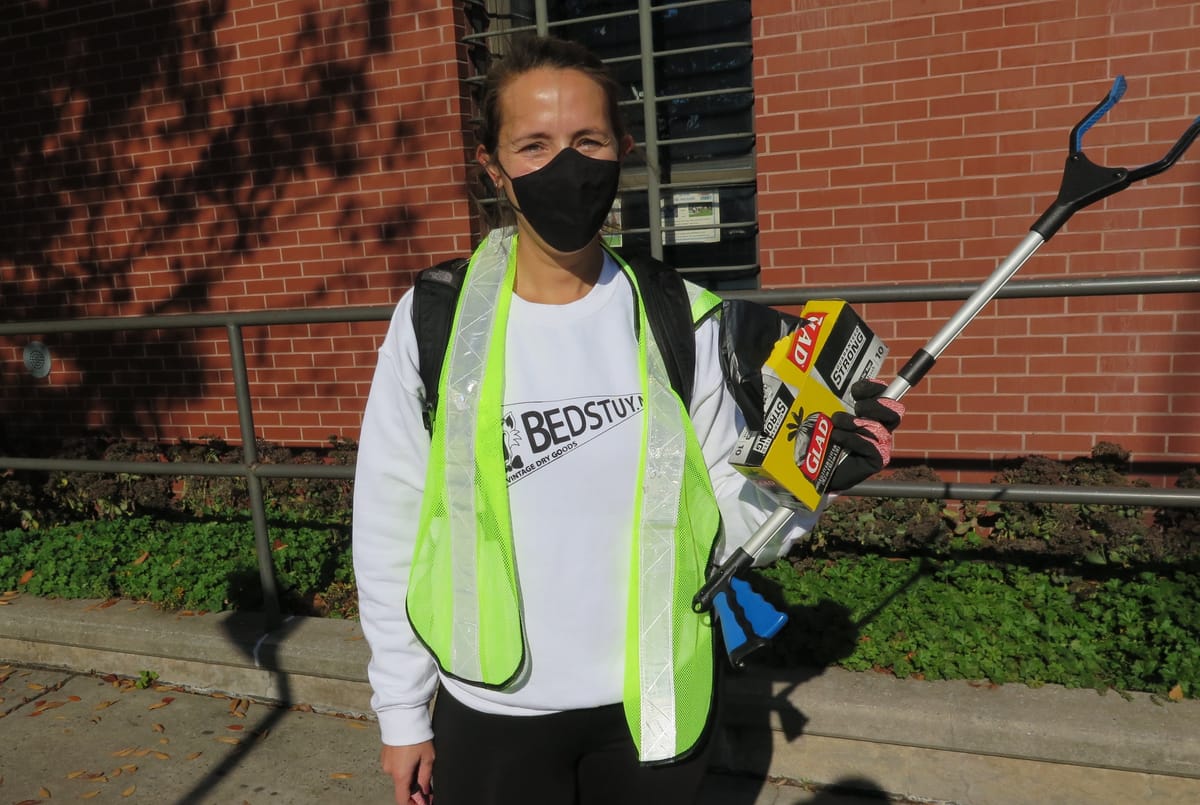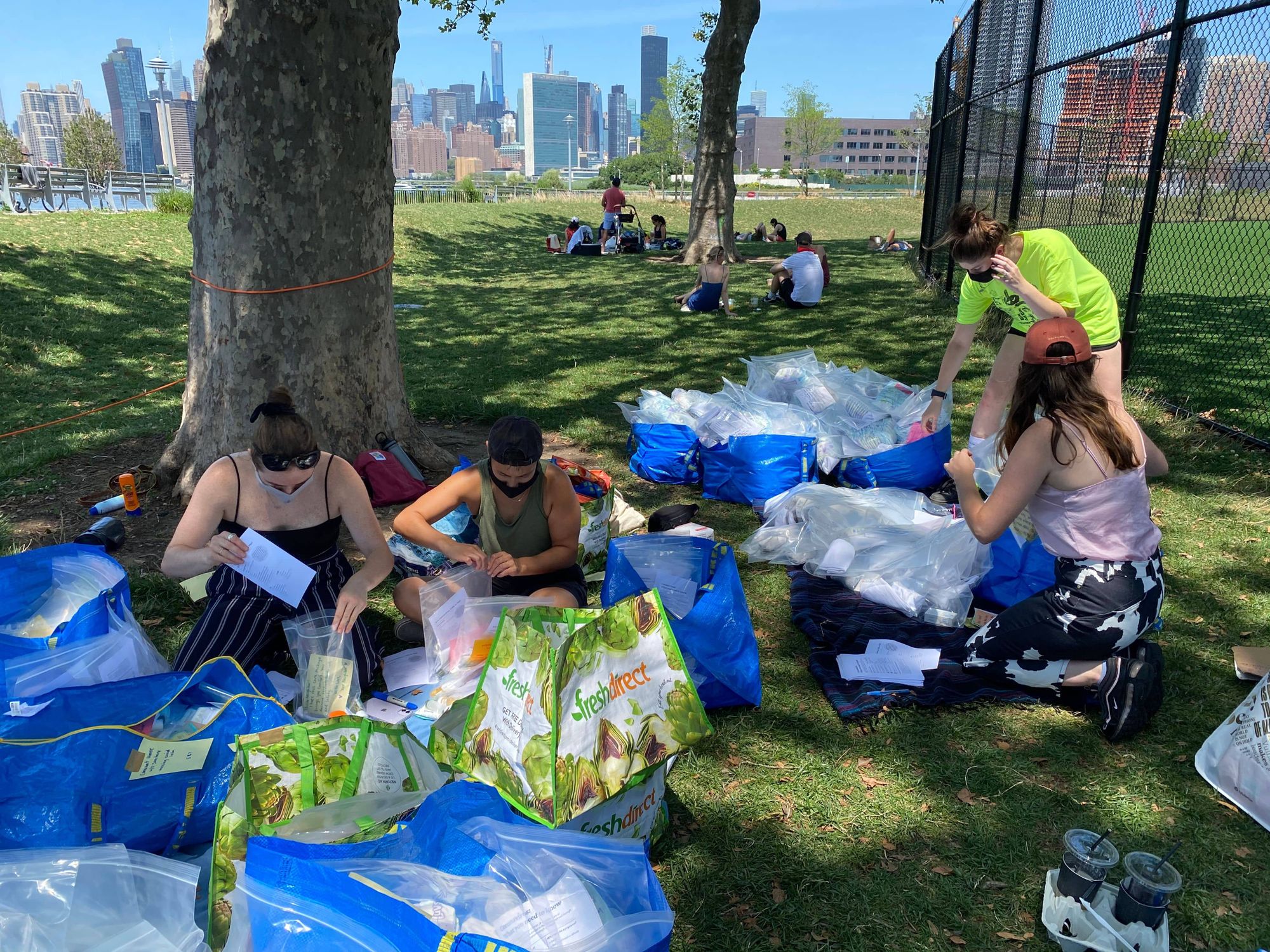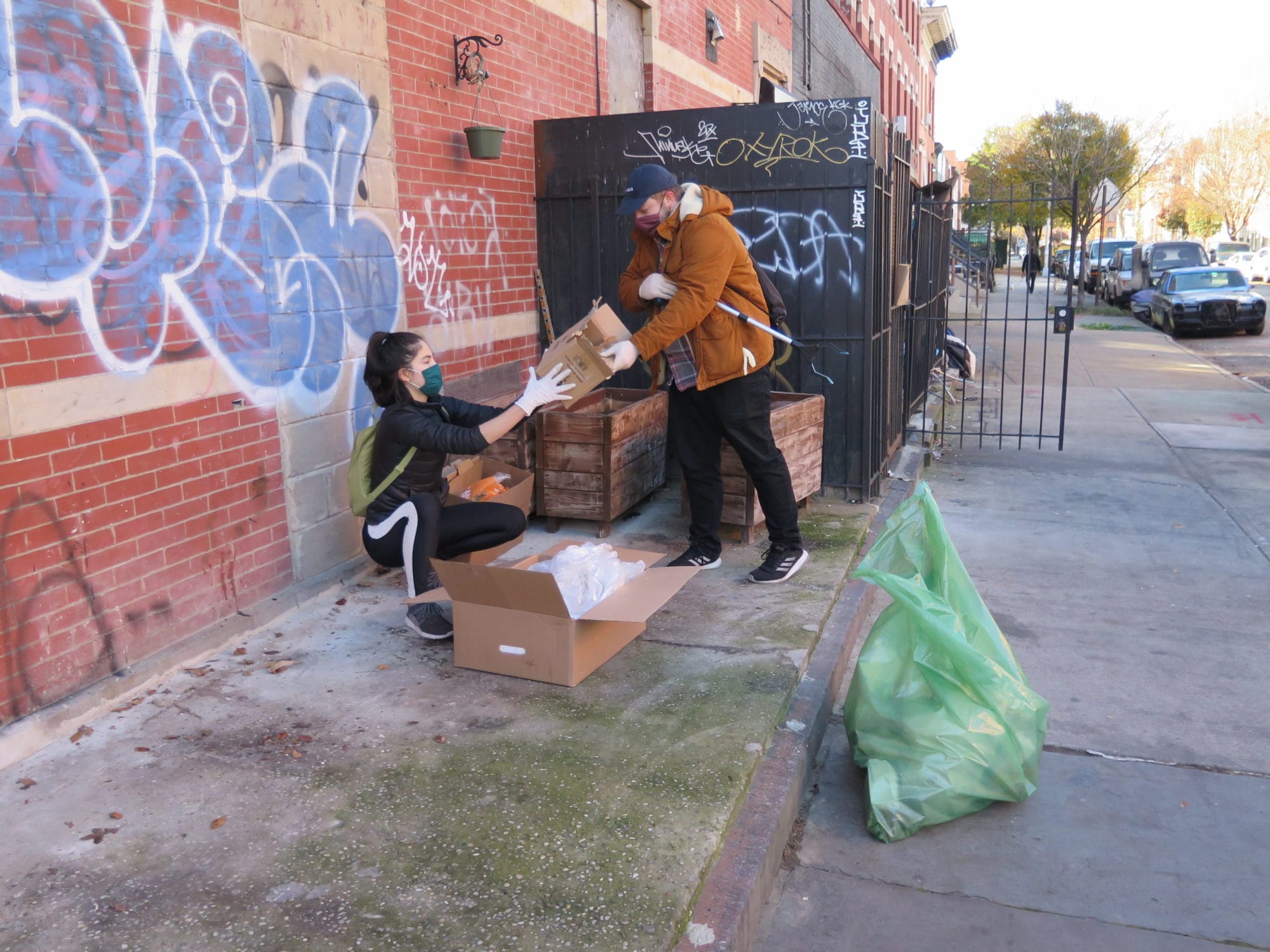Eight Months Into the Pandemic, Brooklyn Mutual Aid Groups Widen Focus


As the coronavirus spread through New York this spring, shuttering schools and businesses, mutual aid groups of “neighbors helping neighbors” sprang up around the city. More than eight months later, many mutual aid groups in Brooklyn have expanded beyond their initial work of providing food and PPE to neighbors in need. From picking up trash to getting out the vote, organizers say volunteers’ interests have driven the wide-ranging new initiatives.
Even before connecting with North Brooklyn Mutual Aid (NBKMA), Greenpoint resident Rae Ellis had started gathering personal care products like soap and toothpaste to distribute to neighbors experiencing homelessness. Ellis told Bklyner that having access to hygiene products is important for comfort and dignity under normal circumstances. During a pandemic, when one of the best defenses against disease is frequent hand washing, “it becomes life or death.”
Ellis started building “hygiene kits” over the summer, fundraising through her social media, before getting looped into her neighborhood’s mutual aid group.
“The difference is now I have this network of people I can draw on,” said Ellis. “You can just reach out at any point, like, ‘hey, I need someone to help me pick up this bag of whatever from this place tomorrow.’ And within five minutes, you have like ten volunteers.”
Another NBKMA volunteer, Shana Kimball, started delivering food and PPE early on in the pandemic. Over the summer, amidst nationwide protests and calls for racial justice, she began thinking about how an undercount in the ongoing U.S. Census could lead to underfunded and underrepresented Brooklyn communities. She looked up North Brooklyn’s current response rate, which stood at about 50%. Kimball began organizing NBKMA volunteers as Census canvassers. Equipped with iPads loaned by the Mayor’s Office, volunteers turned out at community events like farmers’ markets throughout the summer and early fall, spreading the word and helping dozens of people complete the survey on the spot.
“It felt like we were trying to move mountains, but it was good to see the collective effort,” Kimball said.
In October, as the Census wound down and the presidential election approached, the group’s efforts shifted to voter outreach. Although mutual aid is often associated with progressive political movements, Kimball said the outreach was non-partisan voter education, focused on letting people know where and by what methods they could vote this year.
“If politics aren’t at the center of what you’re doing, it lowers the barrier for cooperation and collaboration,” Kimball said.

South Brooklyn Mutual Aid (SBKMA) founder Whitney Hu has found it useful to separate electoral politics from political education. SBKMA works in Sunset Park, Borough Park, and Bay Ridge, which includes many undocumented residents and some of the city’s most politically conservative neighborhoods. The group’s volunteers come from all over South Brooklyn.
“I definitely have seen and had conversations with people [volunteers] who are struggling with some of this rhetoric,” Hu said, referring to a political vision shared by many mutual aid organizers that includes, for example, canceling rent and guaranteeing income through the pandemic. She said that often changes when volunteers start doing the work and seeing its impact.
Rather than endorse political candidates (Hu herself is running for City Council District 38) or “negotiate with a system that is always going to harm Back and brown and immigrant communities,” Hu hopes mutual aid volunteers will come to see that system more clearly — and maybe start to question it.
“Why is it radical that we’re imagining a community where our neighbors have food, shelter, and warm clothes during the winter?” Hu said.
Bed-Stuy Strong founder and mutual aid organizer Sarah Thankam Mathews believes in taking the long view, both when assessing how we got to this moment and when imagining where we go from here. The coronavirus pandemic, she said, did not create so much as exacerbate long-standing inequities around wealth and food security.
“There is a larger structure that has created this crisis, and we need to work against that structure as well,” Mathews said.

That doesn’t mean what she called “capital-P Political Organizing” should necessarily begin right away. Meeting neighbors’ basic survival needs comes first. The strength of mutual aid, she said, is in the connections it fosters in communities.
“It’s about building the relationships so that later and together we can work on what needs to be worked on,” Mathews said.
Organizers say that’s part of what makes initiatives like neighborhood clean-ups important, even if, on the surface, the issue is not as dire as keeping people from going hungry.
Starting in August, Natalia Paez organized clean-ups in and around Bed-Stuy’s Herbert Von King Park. An average Saturday clean-up crew was about 25 volunteers. The final clean-up of the season, on Nov. 21, drew around double that number.
“If there’s trash in the street, it’s not life or death, but at the end of the day, everyone wants a clean, healthy, happy place to call home,” Paez said.
The clean-up crews grew to include neighbors who had never heard of Bed-Stuy Strong, including seniors who weren’t using Instagram or Slack. Instead, Paez said, the park regulars saw the volunteers and their trash bags and joined in.
For Ellis, who builds the hygiene kits, those kinds of organic relationships are one reason she was happy to bring her project under the umbrella of NBKMA.
“Any nonprofit or government can provide charity, but charity isn’t going to be what makes a difference in the long run,” Ellis said. “The difference is the connections and the community that mutual aid builds around these different activities.”
When and if the time comes to mobilize around specific political actions, Brooklyn mutual aid organizers hope those connections will be their greatest strength.
To request help, donate, or to get involved with a mutual aid group in your neighborhood, visit:
To request help, donate, or to get involved with a mutual aid group in your neighborhood, visit:
To locate a mutual aid group in your neighborhood, visit: https://mutualaid.nyc/




